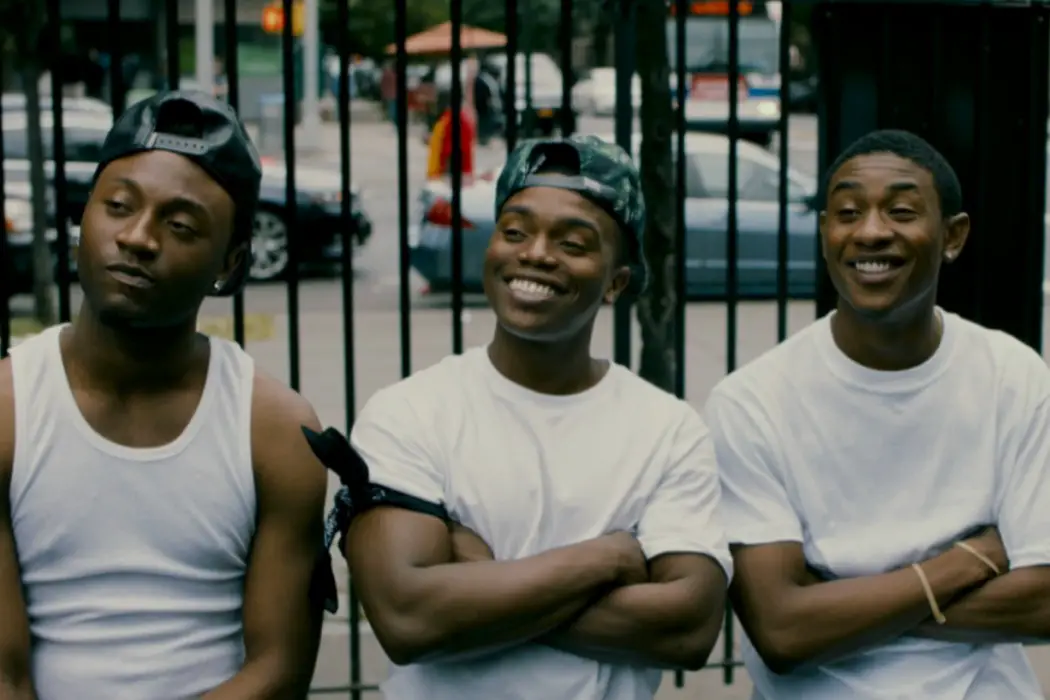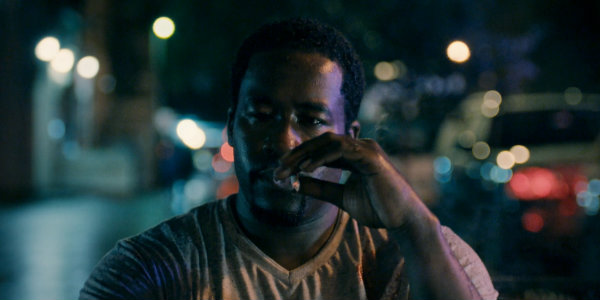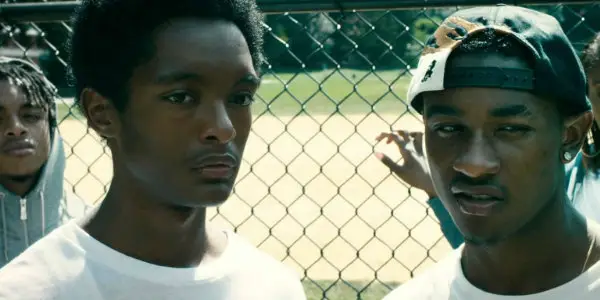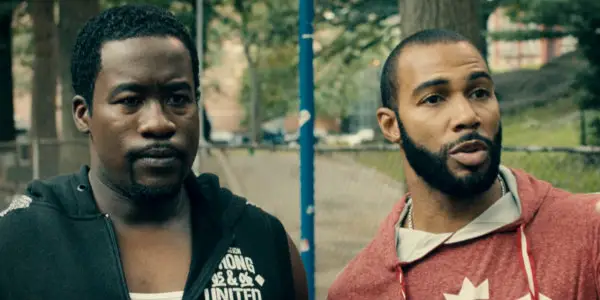CHAPTER & VERSE: Embracing Black Souls

English Major, Film Buff, and Citizen of the World, Sean…
Written and directed by Jamal Joseph, alongside co-writer and star Daniel Beaty, Chapter & Verse tells the familiar story of an ex-con coming back to his old stomping grounds in Harlem, New York. Required by law to live in a half-way house and work at a local food bank—all despite having garnered a significant amount of knowledge and expertise in computer programming and repair in prison—Beaty as Lance walks around with a wounded humanity and pathos that is immediately endearing. His tumultuous past is hinted at in spare moments of heated reflection and confrontation, and his newfound hope for a better future is glimpsed, however briefly, in his mentorship of the young would-be thug Ty (Khadim Diop).
By the end of Joseph‘s latest directorial effort, there is very little hope for Lance, but the foundation that he lays for Ty is selflessly given and imbues the darker shades of contemporary racism with some guarded optimism. The weight of black lives lost too soon, like those of Trayvon Martin and Eric Garner, lingers in the background of Chapter & Verse like a shadow threatening to swallow Harlem whole. Much like the contemporary American domestic landscape, Chapter & Verse strives for a better tomorrow while fighting against a lesser today.
Shadows from the Past
There is an undeniable pallor that’s cast across Beaty‘s very being throughout Chapter & Verse that tragically defines his continuing existence and livelihood. Offered few alternatives in a neighborhood gripped by poverty, unemployment, and prejudice, a younger Lance turned to a life of crime out of necessity. Education and job security were forced to take a back seat to basic survival skills. The inescapable repercussions that followed are predictable, but in Beaty‘s personally-told story and viscerally realized performance—and in Joseph‘s restrained direction—his hurt is made all the more real because of it.

For some viewers, Chapter & Verse might ring with the hollowness of redundancy. There have been plenty of movies like it—many of which were ironically written and directed by resident executive producer Antoine Fuqua of Training Day fame—and Beaty often falls back on the beats of a familiar refrain. His struggle rings with the same melancholy that has been at the center of so many tales of urban desperation. His face is a familiar one, and the temperament that resides behind it shouldn’t surprise anyone who has been paying attention to the state of race relations over the course of the past two presidential election terms.
Yet there is an undeniable integrity to the story that Beaty decides to tell. Lance’s trials and tribulations aren’t groundbreaking, but they are perennially recurrent and relevant to the current of contemporary society. The black man is still the Invisible Man, and the Black Lives Matter movement is an especially painful reminder of just that. As a reflection on the deaths of people like Trayvon Martin and Eric Garner, Chapter & Verse is an especially moving ode to the continuing trials that people of color face in America, and the kinds of traps that they become ensnared within simply because of the rung on the social ladder to which they were born clinging to.
A Better Tomorrow
When Lance is reunited with former childhood friend Jomo (Omari Hardwick) at the film’s second quarter mark, there is a moment of subtle transcendence. In much the same way, Lance’s mentorship of the young Ty serves as the signifier of a better tomorrow ever on the horizon. Even if everyone in Chapter & Verse doesn’t manage to see the crisp, clear sunshine of personal absolution outside of the constraints of racial profiling and ghettoized marginalization for themselves, clearing a path for others is the shining virtue that Joesph and Beaty are intent on passing on to their perspective audience.

The callousness with which Trayvon Martin was snuffed out in the name of a neighborhood watch in 2012 is a national hurt that hasn’t abated over the course of the past four years. Far from it, the subsequent suffocation of Eric Garner from only two years later in New York City—among countless other instances of unrestrained police intervention—has only bred more contempt and hopelessness in urban areas like Harlem. Lance is hardly the first fictional figure to represent the struggles of the black man in America, but the fact that his story still needs to be told at this late stage in American history is a sobering social allegory in and of itself.
For all of Joseph‘s technical imperfections as a director, Beaty‘s original screenplay and performance stand out to make Chapter & Verse a remarkable chapter in African-American storytelling from the twenty-first century. Characters like Lance, Jomo, and Ty should be more than just familiar faces to moviegoers, and not just the footnote to the latest breaking news stories about police brutality. Lance may be headed back to jail by the time the credits finally role, but with any luck Ty will manage to achieve his dreams of becoming a college educated, industry leader in the field of feature film animation.
Conclusion
Beaty should manage to have a bigger career after his work on Chapter & Verse. Likewise, Joseph has proven his dedication to telling intensely personal stories with a national impact that deserve a wider moviegoing audience and a bigger production budget. All of the pieces for an even greater original drama are present in Chapter & Verse, and anyone who sees the movie will no doubt be on the lookout for anything that either filmmaker does next.

There is a poeticism to be found in the story of Lance in Chapter & Verse, and a lot of that lyrical quality has to do with Beaty‘s unflinching acknowledgement of just how bad things still are for most black people living in America today. Nearly ten years into the twenty-first century, tensions between the police and the economically and racially marginalized citizens that they are meant to protect have only grown larger, and the next four years mark another moment of national unrest that will necessitate further civil revolt. Joseph‘s latest directorial effort couldn’t have come out at a time when its message was more needed, but it will be up to its audience to take greater heed of its oft tread rhetoric going forward.
Do you think the Black Lives Matter movement has been adequately represented in contemporary cinema? If not, what aspects of the cultural sentiment would you like to see more accurately depicted?
Chapter & Verse is currently on limited theatrical release in the U.S. Find international release dates here.
Does content like this matter to you?
Become a Member and support film journalism. Unlock access to all of Film Inquiry`s great articles. Join a community of like-minded readers who are passionate about cinema - get access to our private members Network, give back to independent filmmakers, and more.
English Major, Film Buff, and Citizen of the World, Sean K. Cureton is a born and raised Jersey Boy. Having received a B.A. in English from Rutgers University, Sean is proud to call the Garden State his home, equidistant from both the steps that made Sylvester Stallone a household name, and the park where Harry was cordially introduced to Sally, even if he’d prefer to a stay in state due to a certain fondness for a convenience store located in Leonardo, NJ. When he’s not in the multiplex, you can follow him on Twitter, @seankcureton.













